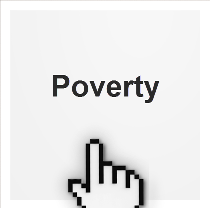Today we are sharing some interesting workplace management advice from an HRwisdom contributor based in Ireland, Paul Mooney. 
Paul leads the Tandem Consulting group and is a former President of the National College of Ireland.
Paul is sharing his workplace management advice on a topic that is rarely discussed in business – managing people from a low socio-economic background.
Over to Paul . . .
Workplace Management Advice – Dealing With Poverty
This week, I want to bring you on this journey that goes back a couple of years.
Picture the scene. I was about to ‘pull the trigger’ on a guy that reported into me.
He had been underperforming for quite a while and had recently stepped over the line.
I was meeting the Full-Time Union Official – simply as a courtesy – to tell him what was about to happen. After he’d heard the details, he made the point: “Why don’t you give him a break. That guy was born with a rusty spoon in his mouth. ”
Poverty Explained
It was a graphic description of poverty and a timely reminder that not all of us have equal privilege. 
The question around why some people are poor is one of the perennial debates in sociology.
A number of structural causes are normally put forward to explain why individuals find it difficult to escape the poverty trap.
These include:
- Low Income: You’re one of a large number of children whose parents never finished second level school.
- Family Support: Your parent’s work in minimum wage jobs. Your father does not support you in any way (€ or emotionally).
- Educational Difficulties: You are gifted with average intelligence. People rarely show interest in your school work.
- Social Capital: You don’t know anyone well who’s been to college. You’ve no real idea what you’d do in college since you don’t have any exposure to the professions.
- Role Models: The only people around you that have money are criminals. Everyone else is poor and a lot of them manage on welfare. No one expects you to be any different.
- Reduced Opportunities: The job you secure is 20 hours a week, pays minimum wage, has few benefits and barely pays for the petrol used to drive there.
- Low Expectations: The goal that everyone seems to have for you is to stay off drugs and stay out of Prison.
Part 2
In the second half of this article, Paul examines the view of ‘moral fibre’ and its perceived impact on poverty.
Paul then shares his advice on how to tackle underperformance.
To find out what happened to the employee in this story, click here: workplace management advice article.
HRwisdom